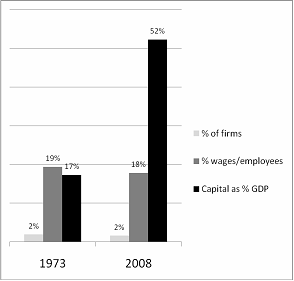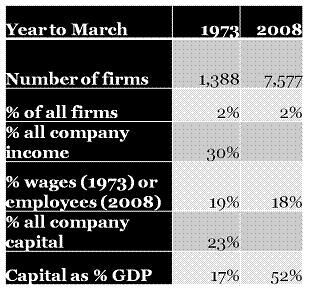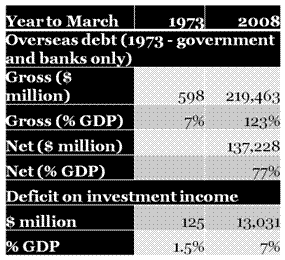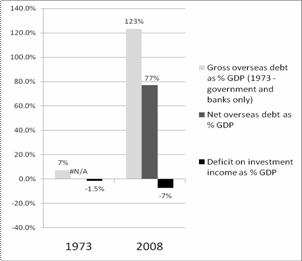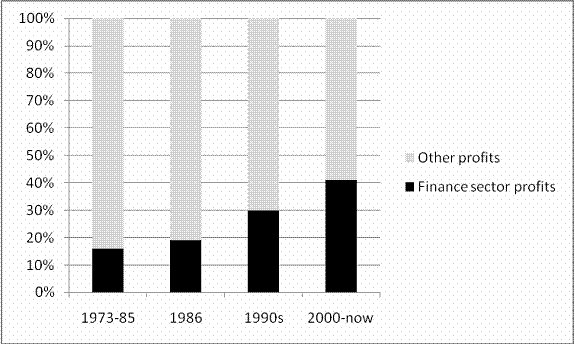|
Forward And Leftward - by Bill Rosenberg This is the speech that Bill delivered at the CAFCA Annual General Meeting in Christchurch, in September 2009. It represents his farewell to Christchurch, after living his whole life there – as of May 2009, he has moved permanently to Wellington, where he is now working as the Economist and Policy Director for the NZ Council of Trade Unions. And it represents his farewell as CAFCA Chairperson, a position he held for 20 or so years (he was a founder member, 35 years ago, and has played a leading role ever since). He remains as a (distance) member of the CAFCA committee; as the CAFCA Webmaster; and as a writer for Watchdog. His speech was accompanied by a PowerPoint presentation. Unfortunately we can only publish some of the charts because they are all in colour and these are the only ones that reproduce well in black and white ( Watchdog has no plans to start printing in colour). For the full 15 pages of PowerPoint slides, go to http://canterbury.cyberplace.co.nz/community/CAFCA/publications/Miscellaneous/Forward%20and%20Leftward%20-%20slides.pdf. If that Link doesn’t work, you will find it in Miscellany, on the Views, Analyses and Research page of the CAFCA Website www.cafca.org.nz. Ed. CAFCA was founded 35 years ago this year (as the Campaign Against Foreign Control in New Zealand – CAFCINZ). So this is as good a time as any to reflect on what we have achieved and where we should put our efforts in the future. Of course, given my move to Wellington, my comments are a little gratuitous. It will be the real (as opposed to virtual) committee, and particularly Murray, who will carry the burden of this. Either my filing system has failed me or it was not published, but the closest statistics I can get to 1974 for overseas ownership of New Zealand’s businesses are for the year ended March 1973. There were then 1,388 overseas companies which made tax returns (either more than 25% overseas owned, or branches of overseas companies – 1.9% of all companies making tax returns) and they earned 30.4% of assessable company income, paid only 19.4% of company salaries and wages and had 22.6% of shareholders funds of all New Zealand companies or $1.410 billion. Those shareholders funds were 17.3% of gross domestic product (GDP). Because of the source of this information – tax returns – these figures need to be taken with a dose of caution, but they give an indication of the situation. We don’t have exactly comparable figures for today but according to New Zealand’s International Investment Position from Statistics New Zealand, there was $94.585 billion in direct foreign investment in New Zealand at March 2008, which amounts to 52.6% of GDP. We can’t give a profit comparison, but at March 2008 (the latest data available) there were 7,577 overseas companies, or 1.6% of all enterprises, and they employed 17.8% of all employees in New Zealand. Overseas Companies In New Zealand – 1973 And 2008
So the stake in the economy that is overseas owned has approximately tripled, while employment due to it (if we can take the wages and salaries they paid as an indication) is still around one in six jobs. As well as this foreign direct investment (involving overseas control of the companies) there is overseas debt and portfolio investment (shareholdings where no control is intended).(1) We don’t have data for portfolio investment in 1973, but do have for overseas debt. In those days a very large part of it was owed by the Government, because of controls on international capital movement and the fixed exchange rate. In any case, statistics don’t appear to exist for the level of private overseas debt other than bank liabilities which amounted to $34.3 million. Government overseas debt was $563.981 million. This total of $598.3 million was equivalent to 7.3% of GDP. In March 2008, total debt – mainly owed by the banks – was a cool $219.463 billion, or 123% of GDP. Net (after lending to overseas residents is deducted) the debt was $137.228 billion or an almost as frightening 77.1% of GDP. Of this, Government overseas debt was $18.437 billion, but it was more than offset by overseas assets of $28.262 billion, making it a net holder of overseas assets of $9.825 billion or 5.5% of GDP. This of course is now changing rapidly due to the financial crisis and recession. Banks owed $135.970 billion of New Zealand’s gross debt, or $109.297 billion net. So New Zealand is hugely more indebted than in 1973. In the year to March 2008, $16.903 billion in investment income flowed out and only $3.780 billion came in, leaving a deficit of $13.031 billion or 7.3% of GDP – more than the contribution of agriculture to our economy, or the amount the Government spent on Health that year. The result of all this is that our current account deficit, which represents mounting overseas debt, is largely driven by the net income on all this debt and investment (and I haven’t mentioned the portfolio investment). In 1973, $188 million was sent overseas in investment income, offset by $63 million incoming, a net outflow of $125 million or 1.5% of GDP – a fifth the 2008 level, and around a third of what was spent on Health. Overseas Debt And Investment Income – 1973 And 2008
All of this is not to bore you with numbers or
depress you, but to suggest, with suitable mea culpas, that CAFCA
has not been the most successful campaign in New Zealand’s
history. That does not mean we have wasted our time. There is no
doubt that overseas investment and debt is an issue that the politics,
business and economic orthodoxy that progressively gained ascendance
from our foundation onwards, with its height in the mid 1990s, would
have liked to have had forgotten. In their view, it was the easy
answer to many problems, and its consequences – a chronic
current account deficit resulting in increasing private debt –
were a private problem which needed no further concern. Treasury
advised when advocating the opening of the economy in 1984 that
such indebtedness and the consequent large current account deficit
“would not be a cause for concern, and would merely be reflecting
individuals’ choices between current and future consumption”.(2)
We kept the issue a live one. Politicians know that when they try to gut the overseas investment legislation, which has become a ritual that occurs about once every Parliamentary term, they will get resistance, not just from us, but from across the political spectrum, including from their own party members. We were honoured and recognised for our efforts in June 2009 when the National Business Review, that fading voice of business reaction, named CAFCA as one of the “protest groups that have been most damaging to New Zealand business”.(3) They kindly credited us with the previous Government’s actions in “blocking a Canadian pension fund bid for Auckland Airport, bailing out Air New Zealand (costing taxpayers almost $900 million) and buying back the railways and creating KiwiRail, showing that governments can damage economies more than ‘transnational corporations’ ever could”. Neither NBR nor the supporters and advocates of higher dependence on overseas investment, privatisation and increased debt could ever bring themselves to acknowledge the costs – like the money wasted on having to buy back a dismembered privatised rail system. The Director of the Security Intelligence Service has also complimented us on still being in existence when most of its other targets have long since disappeared into the history books (and some not even into those). But seeing CAFCA now with more of an outsider’s eyes, and from a different city, I can offer the following observations, largely from a union perspective. Many union activists are aware of CAFCA and hold it in some respect. CAFCA has been a fixture for as long as most of New Zealand’s population can remember, and has continued to fight for what it, and many New Zealanders, particularly unionists, believe in. In our somewhat quirky way we have opposed privatisation and further sell off of New Zealand assets at times when New Zealanders have become increasingly worried about the effects in deteriorating, expensive or out of date services, and increasing liabilities whether as debt or overseas ownership. The Roger Award is well known, and its reports are known as a useful resource. But CAFCA is seen as a Christchurch thing, without a real presence anywhere else. We also need to be aware of the narrowness of our campaign, even though it is capable of touching on most issues that concern New Zealanders. Overseas ownership and debt and oppressive trade and investment agreements, while they do hit people at some point in their lives, scarcely rate against static or falling incomes, lost jobs, rising GST, unaffordable housing, and bullying employers. People are understandably ambivalent about overseas owned firms – it does mean jobs to many people, even if it is only one in six. And some of our worst employers are not overseas ones, but locals. So Where Do We Go From Here? There are some avenues probably not worth our time pursuing. There are others which are reopened by the experience of the global financial crisis. First, generalised opposition to foreign ownership of companies in New Zealand is a lost cause unless you are fighting to overthrow capitalism itself. Even then you will have to overthrow it worldwide. Personally, that is not something I put great hope on, not because I like capitalism (it is innovative but brutal), but because I have yet to see something better with which to replace it. The realpolitik (or real political economy) is that the transnationals control so much of the world’s production, services and trade that a small country like New Zealand, which can never hope to produce every good or service it needs, inevitably has to make use of a transnational somewhere along the line. The position is intensifying, not only because transnationals are taking over more and more of international commerce, but because the rate of innovation is high and increasing. The point is not that transnationals are good innovators (one of the reasons they are interested in New Zealand is to buy up innovations created here) but that we can’t hope to have sufficient expertise to replicate every innovation made anywhere in the world, so we have to import many of them it if we want them. CAFCA had come to this conclusion some time ago. What we can productively do is campaign to
This has always been our bread and butter in any case. Examples are the best way to make it happen, and the Roger is a great generator of examples and publicity. Building our international networks will make it more effective. Control Their Entry Into New ZealandEven the minimal controls (other than when rural land or fishing quota is involved) are constantly under threat, both domestically (as at present with the review of the regime, with control of ownership of strategic assets a particular target) and internationally through trade and investment agreements. Obviously the most immediate threat is the current review. The Government is also working on an investment “protocol” with Australia which would lock in a new $477 million threshold for oversight of investments, and who knows what else. There are current negotiations with South Korea, the Gulf States and Hong Kong for a free trade agreement, and the prospect of negotiations starting with the US and other countries in the “TransPacific Partnership” grouping. Negotiations may also begin shortly with India, and with Thailand to extend the existing agreement into services (which includes constraints on investment rules) and Government procurement. The response of our banking system to the financial crisis has made people very aware that 90% of the assets of our banking system are owned by four not very well behaved Australian banks. In addition, it has become painfully clear that the Financial Services agreement under the General Agreement on Trade in Services in the World Trade Organisation, which is replicated in some form in most of these agreements, bound us and many other rich countries into financial services rules which hamper our ability to prevent another financial crisis occurring – for example by controlling the introduction of risky financial instruments into New Zealand’s financial system. Regulate Financial CapitalThere is talk – and even work going on – worldwide regarding the need to tighten the regulation of financial markets, because it is now recognised, at least by many, that an unregulated financial system can lead to it hugely outgrowing its economic usefulness and to disaster as it takes greater and greater risks (in fact there is also a high risk that those who benefitted from the dangerous system that caused the crash will carry on regardless and resist any changes). US Corporate Profits (4)
To a large extent this movement is bypassing New Zealand: our Government appears to be acting as if it can carry on regardless in the comfortable belief that our banking system wouldn’t allow to happen what happened in the US and Europe because it didn’t happen this time. In fact it was very vulnerable to failure because of its huge reliance on short term overseas funding. The same system is a major cause of our high debt levels, chronic current account deficit, and volatile and overvalued exchange rate that handicaps exporters. And if we want examples of transnationals behaving badly, we don’t need to look much further than the big four banks, with tax evasion, off-balance sheet funds, and unconscionable pressure on their customers to take on unaffordable debt through incentive payments to their unfortunate staff. On top of that, our financial system is not doing a good job of financing expansion of production by firms, preferring to finance mortgages which caused the housing price bubble. One financial regulator, in the UK, has even revived the idea of a Tobin* Tax – a very small tax on financial transactions to put “sand in the wheels” of the financial system to make its excesses less attractive. This is a highly technical area, difficult to understand, let alone keep up with, but it is crucial for economic stability. * Named after its proponent, the economist James Tobin. Ed. One area of special interest to New Zealand is to control capital movements in and out of New Zealand. I covered this discussion in the article “Financial Crises, Trilemmas, And A Time To Rethink” in Watchdog 120, May 2009, http://www.converge.org.nz/watchdog/20/02.htm. Its time has come, because the Reserve Bank has been shown to be close to impotent in using its official cash rate to control the money supply and the interest rates that affect mortgages and business lending. There is a well understood reason for this: without controls on international capital movements, international financial market conditions determine the exchange rate and the availability of finance domestically. That leads on the one hand to asset price bubbles and on the other to recessions deeper than is necessary. But further, the level of overseas debt – which Treasury in the 1980s thought was not a worry to anyone but those private parties to the debt – is now being identified by the Credit Rating Agencies as a reason to threaten to downgrade New Zealand’s sovereign debt rating, even though the Government’s debt levels are very modest by international standards. It is well over time that action was taken to control overseas borrowing, and the banks which are responsible for 70% of it according to the leading economist, Geoff Bertram. The combination of the financial crisis, the continuing difficulties in New Zealand’s export sector, and the effects of that “private” indebtedness (private but with public effects) is a strong rationale to rethink old orthodoxies on the control of capital. In Conclusion I’ve spent a large part of my life working on CAFCA matters, with CAFCA and of course with Murray in particular. There has never been a shortage of issues. A Rightwing government helps! But while CAFCA has recognition from Left and Right, our effectiveness as CAFCA is limited. CAFCA needs to focus and to ensure that what it focuses on is relevant and persuasive, and not just a repetition of comforting old slogans. Some of those old slogans may well still have truth in them, but they need to be constantly re-examined and put in a current context. Otherwise we may feel comfortable, but so will those resisting change, because we will have no persuasive case to the public for that change to happen. There is plenty to do, and it needs creativity, intellect, and persuasive communication. I wish the incoming committee and Murray, in particular, all the best. Footnotes 1 There is a technical point here. Some “debt” is owed by subsidiaries of overseas companies to their parent and is counted as part of foreign direct investment. To an extent we are therefore double counting in this discussion of debt. But this distinction was not recorded in 1973, and so the comparison given is probably the best we can do. 2 “Economic Manage ment”, The Treasury, 14/7/84, p162. Given that the fiction of a crisis in Government debt levels was one of the myths used to justify many of the dramatic and ultimately disastrous policies of the 1984 Douglas/Lange Labour govern ment, the ideological basis of this state ment is particularly obvious: Government debt bad, private debt good (or at least nothing to worry about). Their policies led to a privatisation of public debt, much of which was owed overseas, though public debt continued to increase and it was a further decade before it returned to 1984 levels as a proportion of GDP. Similarly, the Financial Responsibility Act (now Part 2 of the Public Finance Act) committed the Government to “reducing total debt to prudent levels”, but required only annual reporting on the current account deficit (though not the overseas debt). 3 “Companies count the cost of radical action”, by Niko Kloeten, 5/6/09, pp6-7. 4 From “The Quiet Coup”, by Samuel Johnson, The Atlantic, May 2009, http://www.theatlantic.com/doc/200905/imf-advice, accessed 5/4/09. Non-Members:
|
 Return to Watchdog 122 Index |
 |
